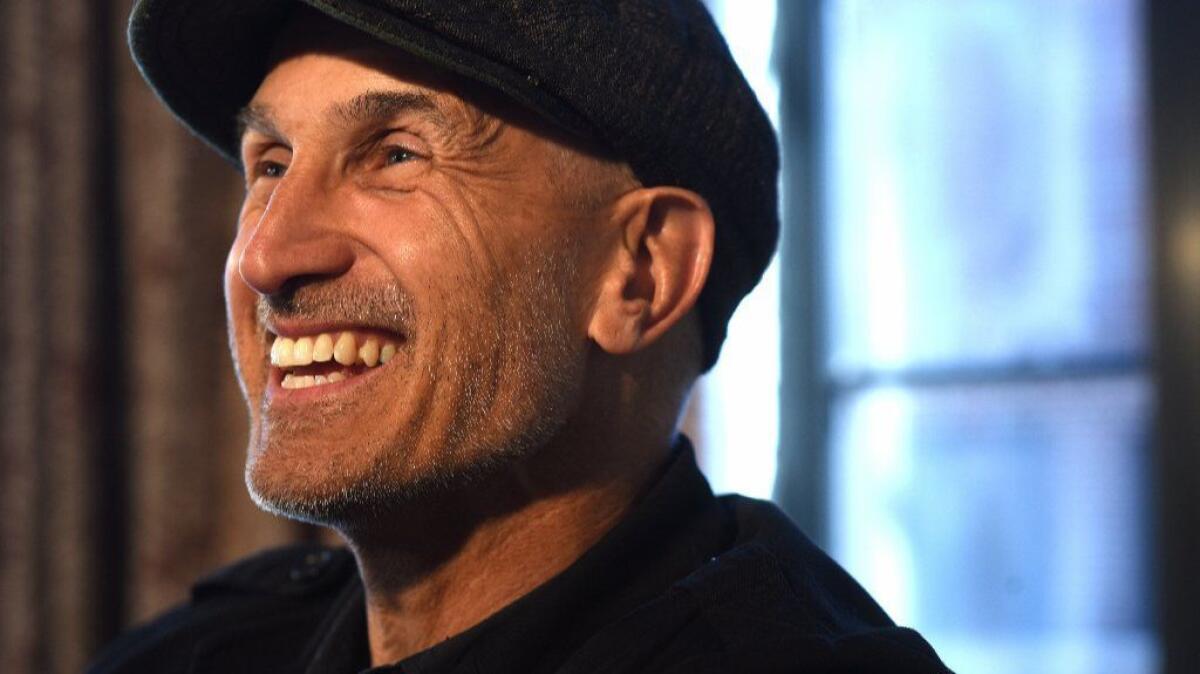Director Craig Gillespie puts his unique blend of humor and empathy at the fore of ‘I, Tonya’

- Share via
Reporting from New York — It’s been a big year for director Craig Gillespie. Not only is his new film, “I, Tonya,” about the life of Olympic skater Tonya Harding (and her infamous connection to fellow skater Nancy Kerrigan, who was attacked before the 1994 Winter Olympics) part of the Oscar discussion, he also turned 50. And perhaps the two are not unrelated: As the Australia-born, naturalized U.S. citizen told The Envelope during a conversation at the Bowery Hotel here recently, he’s learned it’s about the journey – not the destination.
So which is more exciting, turning 50 or getting your new movie talked about for the Oscars?
This film has honestly been the most enjoyable experience I’ve had. Something about the whole nature of it was fearless. There were no naysayers, and it was a really safe environment to play in. You go through your 30s and 40s and you’re always striving to get somewhere, and now I’m more at peace with life as a whole. You start to reprioritize, and appreciate what you have as opposed to where you’re trying to get. As you get into your 50s, you see life more as a whole and all the elements that make it worthwhile.
Did that reprioritizing affect your decision to make “Tonya”? You’d made a splash with the indie “Lars and the Real Girl” in 2007 but have been off working on studio films ever since.
I love working with Disney, but I’d just come off a very large movie (“Million Dollar Arm”) that took up a lot of my time, spent a year in post, and wasn’t uniquely my voice. Someone long ago said to me, “Why do a film if there are 10 other directors who could do it?” “Lars” was a unique sensibility that I felt very close to. My agent sent me the “Tonya” script and, just like with “Lars,” I knew exactly how I wanted to shoot it. I loved being in this world that’s both tragic and humorous at the same time.
WATCH: Video Q&A’s from this season’s hottest contenders »
You worked in commercials for 15 years before getting into films and as I understand it, this is not your first brush with telling skaters’ stories.
I did the Nancy Kerrigan Campbell’s Soup spot in 1993, three months before [the incident with Harding]. I didn’t know who she was; we got this assignment to do this spot with a skater, went up to Canada and shot the commercial, which I had storyboarded. I like to do comedy and walk this odd line. I found my voice in commercials.
Why did we need a movie about Tonya Harding now?
We’re bombarded with social media and headlines, and people being chewed up and spat out so quickly. She’s been this villain and this punch line for 25 years. I felt there was an angle to be not so judgmental and have some empathy in life. Not that she wasn’t in the wrong; she should be held accountable. But steps are taken in terms of a life and choices she makes, and the environment she grows up in are all part of her story. We haven’t heard that.
Do you think people will read your call for understanding about mistakes into some of the recent scandals and headlines?
There’s a kind of movement going on right now in film, and a lot of it is dealing with all the outrage and anger that’s happening, and how you transcend that creatively. This has become a kind of outlet in a way, with films like “Three Billboards Outside Ebbing, Missouri” and “Get Out.” There’s a lot of anger in our society starting out with what happened in the election, and all these new allegations. I think that’s what kicked it off.
Is the indie, quirky feel of “Tonya” where you’re hoping to make your mark more regularly now?
After “Lars” I got very precious; I wanted to emulate that. But it’s so hard to do anything in the film business. Getting to do “Tonya” was like being let loose in the candy shop. This is the niche I do want to stay in, and I’ve stepped away from the metric of economic success. “Lars” didn’t really perform, and I took that hard at the time. But over the years I’ve fallen in love with that film and what it represents for me.
And it all comes back to “live and learn and then you turn 50,” eh?
Yes. That’s a learning curve you appreciate as you get older. Whatever happens with “Tonya” will happen, but for me it’s been really fulfilling. And, ultimately, that’s a much kinder goal than worrying about what you can’t worry about. I hope to stay in this world. If there’s something that comes up that’s bigger but still feels like it can be uniquely me, fine, but I’m not in as much of a hurry to be somewhere.
More to Read
From the Oscars to the Emmys.
Get the Envelope newsletter for exclusive awards season coverage, behind-the-scenes stories from the Envelope podcast and columnist Glenn Whipp’s must-read analysis.
You may occasionally receive promotional content from the Los Angeles Times.






